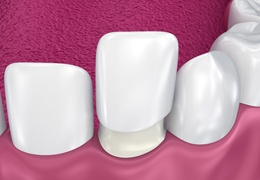Porcelain Veneers – Prestonsburg, KY
Transform Your Smile and Discover New Confidence
Your smile is one of the first things people notice about you. It is how you let others know that you are friendly, approachable, and eager to interact with them. However, you may hold back from smiling if you have noticeable aesthetic flaws in your teeth. Let's talk about how porcelain veneers may be able to disguise those imperfections and give you a gorgeous smile that you can't help but show off.
How Do Porcelain Veneers Work?
Porcelain veneers are ultra-thin pieces of porcelain that Dr. Griffith permanently attaches to the fronts of your teeth. Their purpose is to cover a broad range of aesthetic imperfections, including chipped teeth, small gaps between the teeth, discoloration, asymmetrical teeth, and more. Veneers are custom-designed for each patient, so you can be confident that they will complement both the surrounding teeth and your natural facial structures.
It usually takes two appointments to place porcelain veneers. At the first appointment, Dr. Griffith will prepare your teeth by removing a sliver of enamel from them. This step is to ensure that your new smile won't look bulky or unnatural. Then, we'll take some impressions of your teeth, which a dental laboratory will use to create your custom veneers. You will wear temporary veneers until your permanent ones are ready. Then, you'll return to our office so Dr. Griffith can verify that the veneers are the ideal fit for you before he bonds them to your teeth.
What Benefits Do Porcelain Veneers Offer?

The most outstanding benefits of porcelain veneers include:
- Resistance to stains. Porcelain is nonporous, which means that it will not absorb pigments from coffee, red wine, or other staining substances. You can expect your veneers to maintain their luster for many years.
- Veneers are tough enough to stand up to everyday eating and drinking. As long as you take proper precautions to protect them, (for example, you should always wear a mouthguard when you play sports), they should last for 10 – 15 years or longer.
- Natural appearance. Porcelain reflects light in a manner that is similar to real tooth enamel, so you'll never have to worry that your veneers will look unnatural.
Who Should Consider Porcelain Veneers?

Porcelain veneers may be the ideal treatment for you if:
- You have noticeable aesthetic flaws on your front teeth.
- You are free of gum disease and other significant oral health issues.
- You have an adequate amount of tooth enamel to accommodate the veneers.
- You have excellent oral hygiene habits and will take good care of your veneers.
- You don't grind or clench your teeth.
- Your teeth are moderately straight.
To find out for sure whether you are a candidate for porcelain veneers, schedule a consultation with Dr. Griffith. After he evaluates your oral health and talks to you about your goals and expectations for cosmetic treatment, he'll let you know whether porcelain veneers are a good fit for your circumstances.
Veneers FAQs
Are Veneers Permanent?
A set of veneers can last a very long time. In fact, some patients have their veneers for 15 – 20 years or longer! However, keep in mind that it is likely your veneers will need to be replaced at some point. Therefore, they are not technically permanent.
Also, please note that placing veneers requires that the underlying tooth structure undergoes slight modification. Since a bit of enamel is removed, your teeth will always need veneers or another restoration to protect them. In that sense, veneers can be considered a permanent commitment. (Do not let this scare you — the vast majority of patients who get veneers are very happy with their decision!)
What Happens to the Teeth Under Veneers?
We usually need to remove a small amount of enamel in order to prepare your teeth for veneers. This will not harm your oral health, and it is necessary in order for the veneers to look natural and adhere well to your teeth.
Once your veneers are in place, you will need to continue to take good care of the teeth that support them. You should be sure to brush and floss them regularly (be sure to clean along the gumline and the back sides of the teeth), as well as attend regular dental checkups.
Is There Anything I Can’t Eat with Veneers?
You will have to wear temporary veneers while our partner laboratory is creating your permanent ones. While you have them, it would be best to avoid very hard and sticky foods, which might damage the temporary veneers or even pull them off your teeth! You should also limit your intake of highly pigmented foods and beverages.
After your permanent veneers are in place, you can go back to enjoying all of your favorite foods in moderation. However, keep in mind that, just like natural teeth, some foods are better for veneers than others. Try to minimize your intake of sugary treats and highly pigmented items. You should also never bite down on very hard foods that might chip your veneers, such as ice or popcorn kernels.
Can Veneers Be Used for Bite Corrections?
Although veneers are sometimes called “instant orthodontics,” it is important to note that they do not actually move the teeth. Therefore, if you have any sort of significant dental misalignment, you should consider getting braces or clear aligners prior to moving forward with veneers.
Veneers are capable of hiding minor orthodontic issues. For example, they may be able to make your teeth look longer, which can close an open bite. They can also disguise small gaps between the teeth.
How Many Veneers Will I Need?
The number of veneers you need is highly dependent on circumstances. After our Prestonsburg team evaluates your situation, we will recommend a custom treatment plan. If you have just one or two teeth that you would like to enhance, you may need a very limited number of veneers. However, if you wish to completely transform your smile, you may need as many as 6 – 8 veneers or more.
Also, while many patients get veneers only on their top teeth, some choose to get them on their bottom teeth as well.
